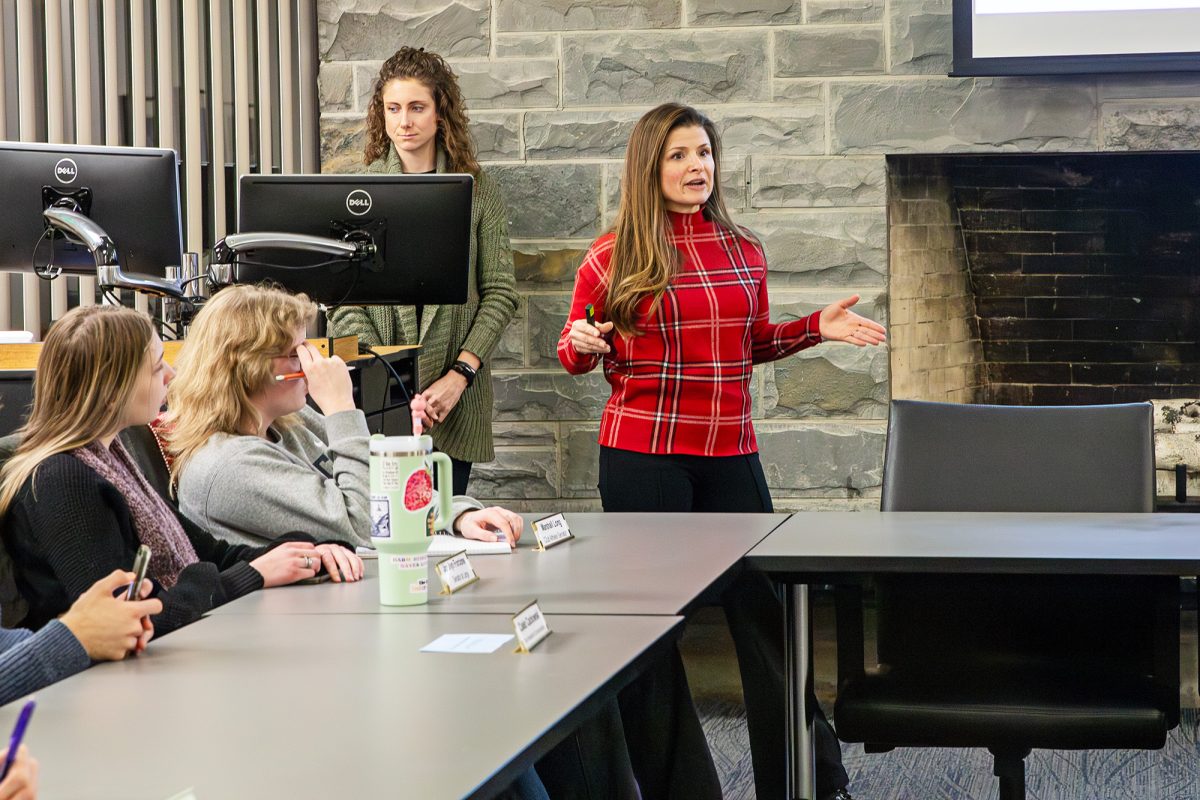The Ithaca College Student Governance Council met Feb. 17 to discuss the use of artificial intelligence on campus with the college’s Applications and Infrastructure team.
SGC was joined by Casey Kendall, deputy chief information officer and associate vice president of applications and infrastructure; and Jenna Lamb, coordinator for AI initiatives and senior IT project manager. Kendall is the chair and Lamb is the coordinator of the Presidential Working Group on AI — a team of two students, three faculty and seven staff — formed in July 2024 to recommend guidelines for the use of AI that aligns with the college’s vision, mission and values statement to the president and her cabinet.
“We’re looking for ways to leverage AI to enhance operations, services and the student experience,” Kendall said.
After its founding, the group divided its operations into a set of six chronological deliverables. The first deliverable was an analysis of the college’s strengths, weaknesses, opportunities and threats in relation to the growing presence of AI; the second was the creation of a list of guiding principles for the ethical implementation of AI initiatives; the third involved creating recommendations for an AI review process by which AI initiatives are evaluated according to the working group’s guiding principles; the fourth involved creating strategic initiatives including AI literacy training for students, faculty and staff; the fifth was a full policy manual review in which Lamb said the group evaluated possible policy changes to include the implementation of AI; and she said the sixth deliverable involved discussions with Human Resources about upscaling college staff to provide training and resources for the implementation of AI.
Kendall said she and Lamb wanted feedback from SGC about the working group’s guiding principles. Currently, there are five guiding principles concerning the use of AI at IC: centering people, not technology, promoting digital inclusion, equity and access, committing to lifelong learning, adaptability and sustainability, upholding and promoting responsible AI research and development and reducing negative environmental impacts.
Several SGC senate members expressed concern about AI’s effect on the environment. Junior Noeline Luyindula, first–generation senator, asked Kendall and Lamb what data the working group has regarding the sustainability of AI.
A 2024 report from the International Energy Agency estimates that by 2026 the electricity consumption of data centers, AI and the crypto currency sector will be equivalent to the energy consumption of Japan. Kendall said that while they do not have enough information on the specific environmental impacts of AI, their group is partnering with Scott Doyle, the director of Energy and Management Sustainability, to ensure the implementation of AI aligns with their fifth guiding principle.
“We’re kind of at a place where it’s hard to find accurate data on how impactful [AI] is, and especially with [the college’s] specific [energy] footprint,” Kendall said. “We are partnering with the [Office of Energy Management and Sustainability] and keeping our eye on it, but it’s been hard to find accurate data.”
Sophomore Senator-at-large Joslyn Forcione asked how the college would respond if more definitive data were to reveal damaging environmental effects of AI. Lamb acknowledges that AI is an energy-intensive technology, and the college will partner with AI vendors that prioritize sustainability measures and approve AI initiatives sparingly.
“The best thing that we can do is be aware of how much we’re using AI [and] not implement AI solutions for no reason,” Lamb said. “Let’s be selective about where we implement things that are energy-intensive.”
The college’s selectivity regarding AI initiatives, which Kendall said might involve a professor seeking to implement AI in their grading process, will be reflected in a review process recommended by the working group’s third deliverable. Kendall said that existing governing bodies, such as the Educational Technologies Advisory Committee, will review AI initiatives to ensure they align with the working group’s guiding principles.
Sophomore Evan Wasserman, School of Music, Theatre, and Dance senator, said he is concerned about the process of accountability for the AI systems.
“We can fire a person, but would we ditch the AI that makes a mistake?” Wasserman said.
Kendall said that before an AI initiative is implemented, it will undergo a pilot stage during which errors can be identified. Lamb added that human oversight will be integral to the implementation process.
“A key part of the AI literacy that we’re talking about … is letting everyone know on campus that AI can be wrong, and anything that an AI tool is outputting needs to be reviewed by a human before it’s put out,” Lamb said.
Lamb said the working group’s next steps toward implementing its AI guidelines are to present its deliverables and guiding principles to governance groups such as the Educational Technologies Advisory Committee and the Board of Trustees before receiving final approval from the president.
Senior Kathi Hodel, vice president of business and finance and head of the SGC’s Appropriations Committee, presented the committee’s third appropriations report for Spring 2025. Hodel said that since the last report she presented at the council’s Feb. 10 meeting, the committee has allocated an additional $17,826 toward student organizations’ operational and event costs. Hodel said the committee has about $70,000 of the semester’s budget remaining, which she said will most likely be fully allocated by March 17.
The SGC is the sole representative body for the Ithaca College student community. The SGC meets from 7-9 p.m. every Monday in the Taughannock Falls room of the Campus Center. The SGC can be contacted at [email protected].














